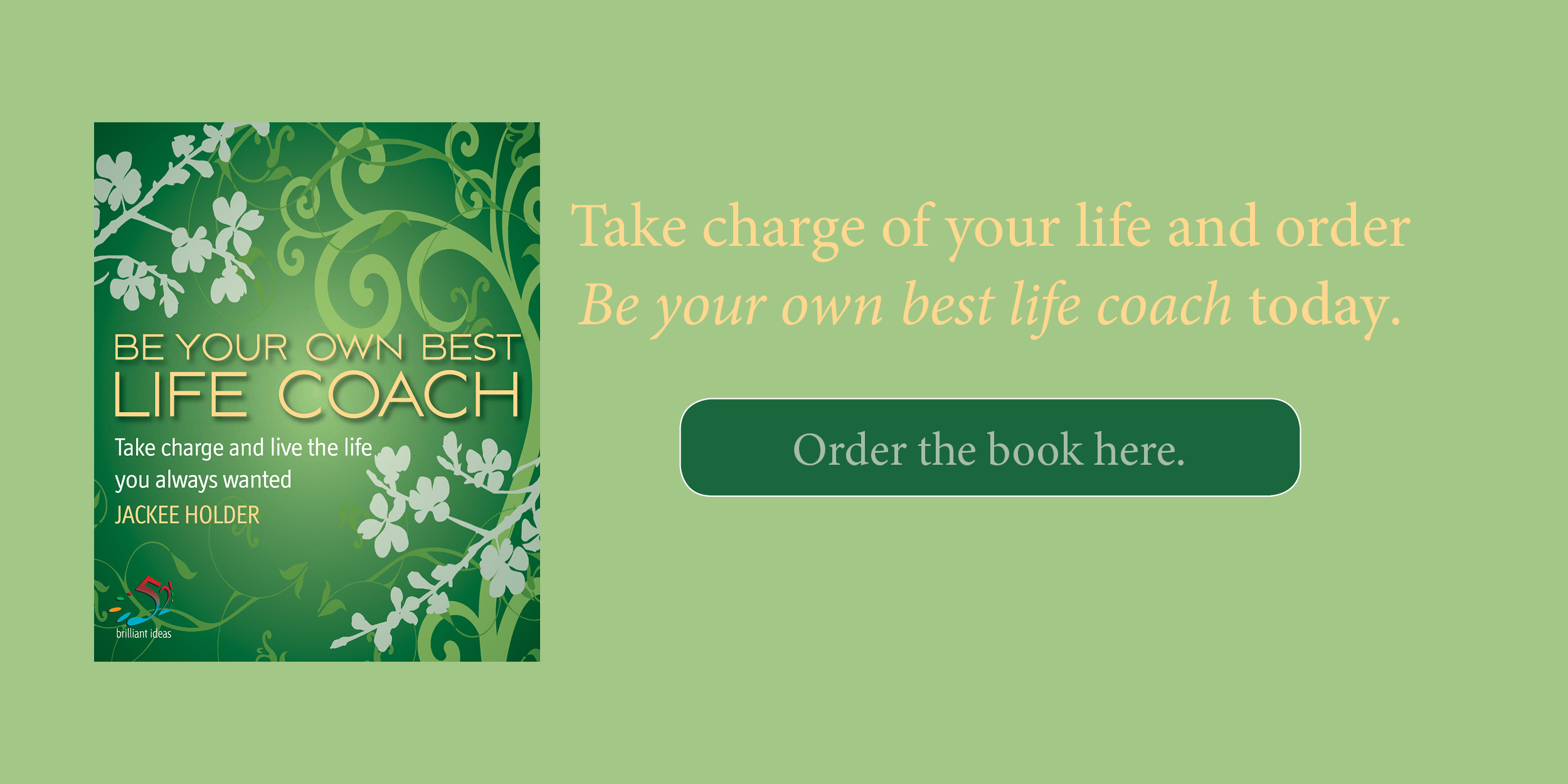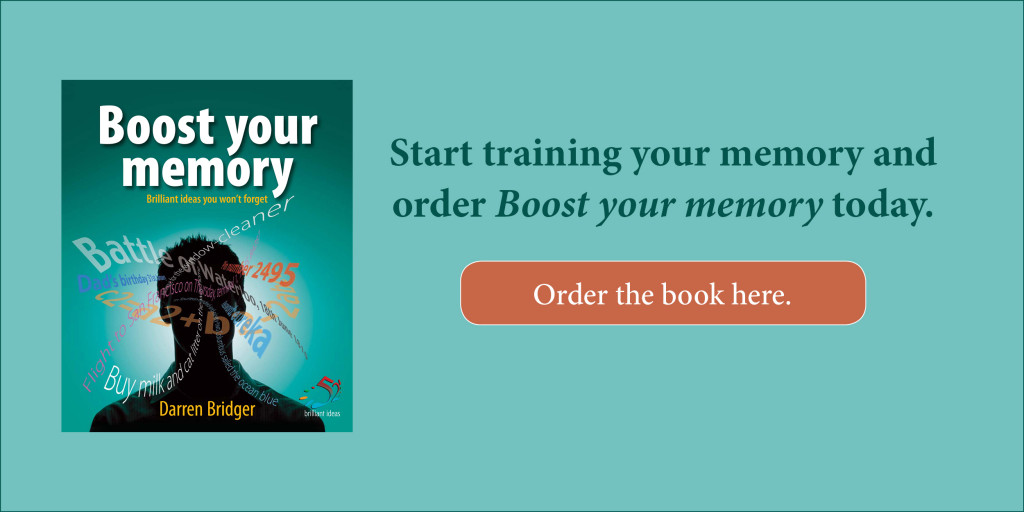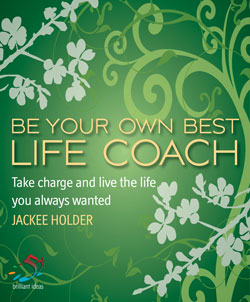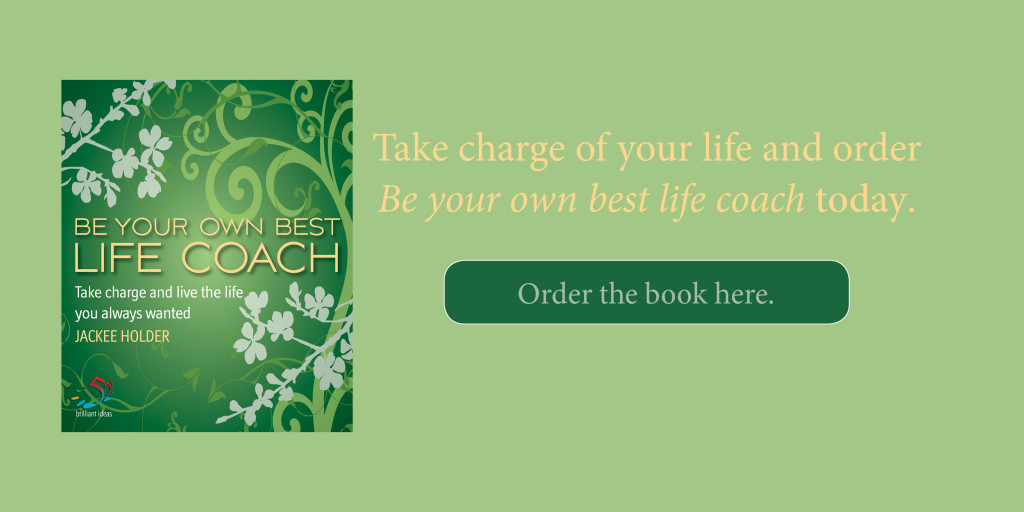Lifestyle
Advice From Your 100 Year-Old Self: Coaching questions to help you access the wisdom and insight of a centenarian
22 May 2014 by Infinite Ideas in Lifestyle
by Jackee Holder, author of Be your own best life coach.
If you had the fabulous opportunity to meet and spend time with a centenarian what question would you ask them?
Last week I had the good fortune to visit an old neighbour who lived across the road from the house I spent most of my childhood and teenage years in. Mrs Jones as I called her back then lives in the same house we found her living in with her family when we moved in across the road in 1965.
My visit coincided with her 101st birthday – unbelievable. I love it that she is a Taurean just like me; my birthday was on Sunday of this week. When I arrived she was walking about – not puttering – in her immaculate upstairs living room which is still stuffed with floor to ceiling cabinets full of every possible kind of souvenir you can imagine, spanning almost the same number of years she has lived.
We sat down on her sofa like two old friends. It’s amazing how age and time closes the gaps between you and the people who were adults when you were growing up. I loved that nothing about her had changed since we last met. She has all of her faculties and senses fully functioning. She was wearing an ice blue jacket and skirt suit (she always knew style) and kept pulling on her wig and asking me if it looked okay before she posed for shots with me.
If you had been eavesdropping outside the door you would have heard us hollering with laughter as she filled me with gossip (as she regularly did when I was a child) and you would have seen her face beaming with delight when I presented her with a huge bunch of flowers for her birthday.
On the way home I found myself deep in thought. Really, to live past a hundred in this day and age is nothing short of a miracle. In her presence I could feel her wisdom that surely is awarded with centenarian age and maturity. That’s why I’ve chosen the following coaching questions. Not many of us will reach the grand age of the centenarians of this era but we can still access the wisdom and insight the centenarian may have for our own lives.
Have a go at asking your 100 year-old self what advice they would give you about transforming:
- Your life right now;
- Your work/career;
- A significant or challenging relationship.
If you had to live your life over again what would your 100 year-old self advise you to do:
- Differently;
- Less of;
- More of;
- The same.
If your 100 year old self could tell you how to make right your biggest life regret what would he/she advise you to do?
If he/she granted you a wish to make the next ten years your best years yet, what would the next ten years look like?
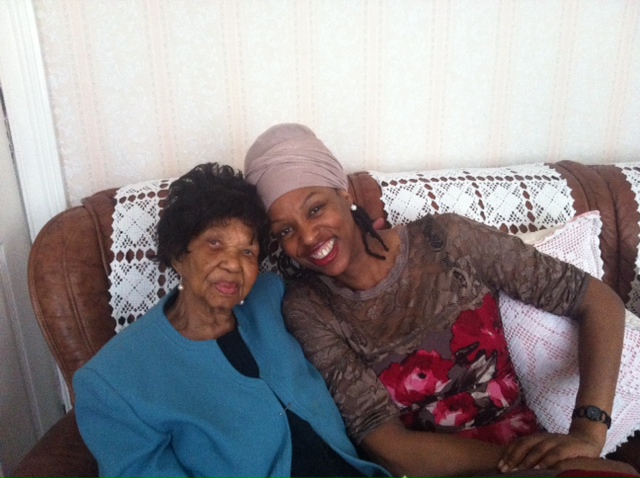
Here we are posing for the camera. My time with her reminded me that life can be short or life can be long so either way we’d better aim to do it right. And by that I mean live the life that has your name on it. In the words of the novelist and writer Oscar Wilde, “Be yourself, everyone else is taken.”
Mosquitoes: banish the bloodsuckers with helpful herbal remedies
21 May 2014 by Rebecca in Lifestyle
Finally the weather seems to be warming up, but just as the rest of us are merrily digging out or shorts and flip-flops the newspapers decide they need to put a stop to our fun. Apparently mosquitoes are becoming increasingly prevalent in urban areas (it’s our water-conserving water butts that are to blame it would seem). So how can you avoid getting bitten and what can you do about it if you’re unfortunate enough to be feasted upon by one of these pesky biters?
Herbal expert Barbara Griggs notes that if your bedroom isn’t mosquito-proofed (e.g. with a screen or a mosquito net), you’ll need to wear an effective repellent. Many people dislike deet-based ones because of the smell or the harsh chemicals. You can buy a natural, delicious-smelling herbal moisturiser called Alfresco, which contains a range of essential oils formulated by a clever lady who once worked at London’s Chelsea Physic Garden and passed rigorous testing at the London School of Tropical Medicine. Numbers of film stars working in bug-ridden locations have sworn by it – including Mel Gibson when filming Braveheart in the midge-ridden moors of Scotland.
 The essential oil of lavender works both as repellent and bite-soother: a few drops on your pillow or in a burner will repel the mozzies, and you can apply it neat to bites and stings. (If you’re off on holiday, by the way, that bottle of lavender oil should be wrapped up tight in cling film before packing unless you want your entire holiday wardrobe to smell of lavender.)
The essential oil of lavender works both as repellent and bite-soother: a few drops on your pillow or in a burner will repel the mozzies, and you can apply it neat to bites and stings. (If you’re off on holiday, by the way, that bottle of lavender oil should be wrapped up tight in cling film before packing unless you want your entire holiday wardrobe to smell of lavender.)
Infinite Ideas’ armoury of natural mosquito-banishing substances also includes products containing citronella. Derived from a type of lemongrass, products made using this repellent include candles, incense sticks and body lotions. Not only does it smell pleasant, it’s efficacy has even been proved in scientific studies. Just remember not to apply the essential oil neat to your skin – put a few drops in a neutral base oil such as almond before massaging it on to exposed areas.
Most important of all though – enjoy the summer!
Quiz: How environmentally friendly are you?
25 April 2014 by Infinite Ideas in Lifestyle
Let’s face it, as a generation we’re spoilt rotten, and may not even be fully aware of the detrimental environmental effects our self-indulgent habits are having on poor old Earth. But there’s nothing like a bit of self-assessment to kick start the conscience. The idea behind the quiz is to give you a rough idea of how much work you need to do in your quest for an environmentally friendly lifestyle that leaves less of an imprint on our troubled planet.

1 How do you mainly shop for food?
(a) You don’t – it’s all home produced.
(b) Online certified organic delivery schemes.
(c) At local markets and grocers.
(d) At the supermarket.
2 It’s lunchtime in the office. Do you:
(a) Dive into your organic, homemade packed lunch?
(b) Order something decent at an upmarket macrobiotic café?
(c) Go where everyone else is going, e.g.the pub?
(d) Head for the nearest fast-food chain or work canteen?
3 How do you get to work/school?
(a) Walk or cycle.
(b) Take public transport.
(c) Share lifts.
(d) Drive.
4 When the temperature drops, what do you do?
(a) Do nothing – your home is insulated and solar-powered.
(b) Put on another jumper and shiver.
(c) Turn up the thermostat just a little.
(d) Whack up the heating as far as it goes and bring in extra heaters.
5 What kind of holiday do you mainly take?
(a) A working conservation holiday.
(b) Something low-key and national.
(c) A package holiday somewhere warm.
(d) As exotic and far flung as possible.
6 What are your cleaning materials of choice?
(a) Lemon juice and bicarbonate of soda.
(b) Eco-friendly products.
(c) Anything from the supermarket that works.
(d) A whole army of branded mousses, sprays, wipes and liquids.
7 How much do you recycle?
(a) Virtually everything, and the rest goes to charity.
(b) Newspapers, bottles, cans, vegetable matter.
(c) Newspapers and maybe bottles sometimes.
(d) Nothing – it all goes straight in the bin.
8 What kind of car do you own?
(a) You don’t.
(b) A small, low-emission model.
(c) A people carrier or family saloon.
(d) A nice big SUV.
9 What sort of presents did you give last Christmas/birthday?
(a) You didn’t – the money went straight to charity instead.
(b) Ethical presents for good causes.
(c) Catalogue/online goods where some profits go to charity.
(d) Whatever the recipients wanted.
10 How ethical is your bank?
(a) Very: that’s why you chose it.
(b) It has several good environmental policies.
(c) Not sure, but hopefully pretty good.
(d) You went for the best deal – ethics didn’t come into it.
Mainly (a)s. Congratulations, you are fully committed to the environment and well on your way to becoming a green goddess – or god, of course.
Mainly (b)s. You’re definitely aware of what it takes to be green although there are one or two luxuries you’re not prepared to give up just yet. But keep up the good work, and you’ll be doing your bit for the planet in no time.
Mainly (c)s. The will to change is there, but you’ve got some way to go before youwin the Zayed Prize for the Environment. You just need to spend a little more time thinking about how your actions could affect the planet.
Mainly (d)s. Oh dear, you’re something of a walking eco-disaster. Time to change your wasteful and spendthrift habits for a greener, cleaner lifestyle.
Five ways your computer can make you smarter
25 April 2014 by Infinite Ideas in Lifestyle
by Darren Bridger, author of Boost your memory
Depending on how we use them, computers can make us smarter or dumber. The explosion of information available to us online can leave us feeling overwhelmed, distracted and unable to concentrate deeply. Also, ever since a super-computer beat world chess champion Gary Kasparov in a game in 1997, our days as the most intelligent species on the planet have seemed numbered. Many jobs are already being automated with the trend set to continue into the future.
 Is there anything we can do to effectively adapt to this smarter, faster-paced world?
Is there anything we can do to effectively adapt to this smarter, faster-paced world?
The truth is that we can work in tandem with computers to enhance our own intelligence. Until the day we can all have a silicon-chip implant to make us smarter, here are some apps and ideas to use your computer or smartphone to boost your intelligence.
Memory boosting. Whenever we learn something new, our memory of it tends to drop off rapidly. The best way to halt the decline is carefully timed repetition of the material. Apps such as Supermemo, Memrise and Anki have a range of memory-boosting courses which give you timed reminders in order to stop the curve of forgetting.
Speed-reading. Two things slow us down when reading: the tendency to hear the words in our minds and the act of moving our eyes across and down the page. Apps such as Spreeder and Spritz (see our blog post Spritz speed-reading app: A blessing for modern readers?) can cut these problems out by presenting words one by one in the centre of the screen at high speed.
Learn online. Google may appear to have all the answers, but it takes an informed mind to ask the smart questions, and the web offers many other ways to learn almost anything you can think of. Check out Learnist, Khan Accademy and for more advanced courses, MIT’s Open Courseware site.
Boost your IQ. IQ is the horsepower of the engine of your brain. By training our ‘working memory’ – the number of bits of information we can keep in our mind at any one time – we can boost our IQ. Apps such as IQ Boost and BrainFitPro turn working-memory into a game. Persist and you genuinely could improve your IQ.
Track yourself! The ancient Greek aphorism ‘know thyself’ may have become more practical thanks to our computers. Apps such as MoodPanda or TallyZoo can help you track your own habits and perhaps learn about yourself. Alternatively, try using free online spreadsheets (Google Drive) to keep track of anything you like, such as what time of day you feel most alert, or the effect of your diet on your mood. Such tracking could yield big rewards in performance.
Finally, if all else fails and you just want a way to stop the intrusive, concentration-crushing effect of the web, try an app like Freedom, available for PC and MAC, to block you from web-browsing for a set length of time, or Anti-Social, which does the same but just for social media sites like Facebook.
Break your bad habits: Letting go of defence mechanisms
25 April 2014 by Infinite Ideas in Lifestyle
by Jackee Holder, author Be your own best life coach
Coaching yourself requires drawing on huge amounts of self-honesty, openness and confidence. A friend of mine was surprised by my recent comment about not always feeling confident. It got me thinking. Confidence is something I’ve learnt to do. It’s also a way I’ve defended myself (for more information on defence mechanisms check out chapter 19 in Be your own best life coach).
Sometimes my confidence is motivated by experiences of racism growing up in inner city London and wanting to prove that I’m good enough to those who didn’t think I was. Other times it’s fuelled by the memory of a physically abusive boyfriend when I was aged seventeen, and more often than not it’s to protect myself against the low-self esteem inherited through a trauma I experienced at the age of seven. This bravado of confidence sometimes means that when I’m being vulnerable people miss it or just don’t get it. It’s hard work always trying to get it right, running a perfectionist streak to prove that you are good enough.
During childhood we construct certain patterns of behaviours to protect ourselves against negative feelings and pain. We call these protective barriers defence mechanisms. For example to protect yourself from a violent or angry parent you may have learnt how to be quiet (even if this was not your true nature) and go unnoticed so as not to be a sitting target. As the years progressed this form of behaviour extended beyond the family home into school, with friends and as adults into the workplace and into relationships. Or perhaps as a child you grew up with alcoholic parents which meant that in order to survive you subconsciously developed care taking qualities, often denying your own true feelings at the expense of putting other people’s needs first. Can you see where this is going?
There’s no doubt that when asked any one of us could provide valid, strong and justified reasons for constructing these barriers. In many instances the creation of these protective walls and defences would literally have saved lives. However, these early intrusions can actually get in the way of healthy and natural development. When we feel vulnerable it can be hard to imagine that we will ever emerge whole and better off. We want to ward off yucky emotions like shame and humiliation, so we fall back on what we know and our defences become entrenched. Our reactions and responses become more and more habitual and automated. In no time at all we’ve established a well-oiled response even when we’re intellectually aware that how we are responding may not be the best or only way.
But it’s worth remembering that as adults we get to choose how much our past informs our present and how we choose to react in the here and now. Here are some tips on how to coach yourself to break free of defence mechanisms and practice new ways of responding and engaging.
Go in the opposite direction
Break the cycle and practice doing the opposite of what you would normally do, even if it feels difficult, awkward or uncomfortable.
Practice mindfulness
Take a moment to pause, connect with the feelings in your body before you take action. Get into a habit of becoming more mindful which will give you more spaciousness and awareness. Self-awareness is key to generating shifts and making change.
Ask yourself how your defences are limiting you or holding you back:
What’s the cost to me of habitually responding in this way?
How do I get in my own way?
What am I not seeing or ignoring right now?
Give yourself permission to experience real intimacy
Being defended or guarded sabotages real opportunities for exploring and experiencing true intimacy. The self-protective barriers put you in a catch 22 position. Vulnerability requires letting down your guard, removing all or a good chunk of your armour and navigating uncomfortable and unfamiliar territory.
Contemplate this question from relationship expert Sarah Abell:
How could I act differently if I did value connection over protection?
Separate the event from the emotions
Part of breaking away from old defensiveness patterns means learning how to separate the event from the emotions. Too often it’s easy to fall into the trap of believing that the intensity of your emotions will consume you. In fact the opposite is often the case. Practice being with your feelings, rather than pushing them away. Don’t try to change them, instead notice them. Soon the intensity of the emotion will subside and in time you will be able to see the wood for the trees.
Have a dialogue with your defences
What was your original intention or purpose?
What were they protecting me from?
Speak directly with your defence mechanisms and let them know what you are grateful for and why you are now choosing to let them go.
Over the next few days contemplate and reflect on the following quote from psychologist Dorothy Rowe:
“Defences keep us stuck in one unhappy place. It takes truth and courage to abandon them, but once we do we discover a world of freedom and wonderful possibilities.”
When you really get behind your defence mechanisms, when you fully understand how they got there in the first place, and when you make the time to examine their effectiveness at this point in your life, so much in your life will shift. I hope this article will help you to realize that it’s time to make the majority of your defence mechanisms redundant.
Don’t forget that a coaching session with a professional life coach can provide a much-needed space for you to let down your guard, to allow more of your true self to be seen and to talk about what you are really feeling or experiencing. To find out more about Jackee’s work visit www.jackeeholder.com, or follow @jackeeholder on Twitter.
Three revolutionary questions: A model for everyday performance improvement
22 April 2014 by Infinite Ideas in Lifestyle
by Jan Gillett, author of Making your work work
It’s easy to come up with complicated ways to change an organisation, but sometimes the simplest of models can be the most powerful. This Three Question Model for everyday performance improvement was developed over twenty years ago by Tom Nolan, Lloyd Provost and colleagues, and has stood the test of time in countless circumstances.
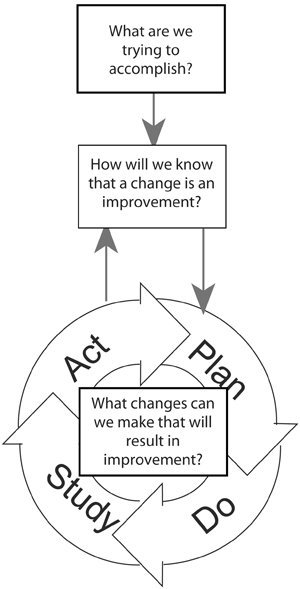 1. The first vital question is ‘What are we trying to accomplish?’
1. The first vital question is ‘What are we trying to accomplish?’
‘Remind me, what are we trying to do?’ This question often seems to emerge half way through a meeting, when the discussion has wandered from the agenda. People then discover that others have several, maybe conflicting, aims in mind, and are hence talking at cross purposes. When the goal is agreed it’s often clear that the right people aren’t there.
We find this confusion extending all the way from a local meeting to an organisation’s whole strategy. When we ask several people in any office or factory what the aim is we are likely to get many different answers. Ask the members of the board and some will say; ‘to maximise profits’ others will say; ‘to satisfy customers’. And these two do not exhaust the possibilities.
So, a vital discipline for leaders is to clarify the goal: large and long term or small and immediate. How can you hope for cooperative improvement efforts if there isn’t consensus on what you are trying to achieve? This is of course not a new idea, but it’s still rare, and hence it can be revolutionary.
That’s good then, we’ve agreed the goal, can we just get on with actions now please?
2. Well, no, as the second vital question is: ‘How will we know if a change is improvement?’
This may also seem obvious but it’s rarely thought through. Without a good answer you can’t know if you are making progress. We find some managers concentrating on cost, others on service levels, still others on innovation, all thinking their measure is the one that counts. Especially if it’s related to a target or bonus. Many measures are too late, only emerging after the product is finished or the customer has experienced the service – just think of all those surveys after the flight / holiday / service call. Many are not accurate or representative. Few represent the live state of the process. If you are going to lead improvement you need to understand how your work is working, as it is working. Just as a chef tastes the dishes during the cooking, you have to develop meaningful in-process measures, as well as results criteria, that relate to your goal.
3. What changes shall we make that will result in improvement?
Only now can the third question be addressed sensibly. The first two questions thus form a wonderful introduction to making your work work better through the Deming Cycle —Plan-Do-Study-Act. This is the model that brings the scientific method to life for managers and leaders, and that lies behind the continuing revolution in cost, quality and innovation across much of the world’s automotive and aerospace industries.
The Three Question Model is useful for any leader in any role, and in my book, Making your work work I explain how to use it at every stage from understanding one’s customers to making improvements in how the work flows, how to respond to problems and how to prevent them from occurring in the first place. It is a cycle, and leaders must make it revolve, as rapidly as possible, and although it is old, it is still revolutionary.

